Ecological Society of America Awards UT Researchers
Ecological Society of America Awards UT Researchers

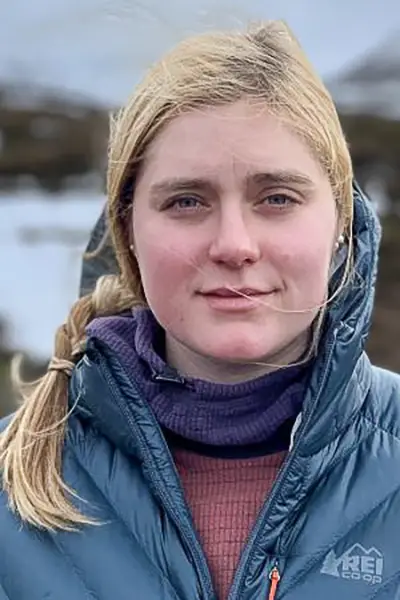
by Randall Brown
Two Vol researchers from the UT Department of Ecology and Evolutionary Biology (EEB) earned honors in the 2024 Ecological Society of America (ESA) Awards. These awards recognize outstanding contributions to ecology in new discoveries, teaching, sustainability, diversity, and lifelong commitment to the profession.
EEB Professor Michael Blum, associate dean for research and creative activity in the College of Arts and Sciences, shared in the ESA’s George Mercer Award, given annually for an outstanding ecological research paper published within the past two years with an early-career lead author.
EEB PhD student Alivia Nytko earned the E. Lucy Braun Award for Excellence in Ecology for her poster presentation at the 2023 ESA Annual Meeting titled, “Plant rarity related to phylogenetic divergence in biomass: Implications for ecosystem function.”
“We are so pleased that our EEB researchers have been recognized by ESA for their scientific achievements,” said College of Arts and Sciences Interim Executive Dean Robert Hinde.
Blum collaborated with lead author Megan Vahsen, a postdoctoral fellow at Utah State University, Associate Professor Scott Emrich from UT’s Tickle College of Engineering, and others on the study “Rapid plant trait evolution can alter coastal wetland resilience to sea level rise,” published in Science in January 2023. Their work calls attention to the significant role of rapid evolution in shaping how ecosystems respond to global change.
They examined a dominant coastal marsh sedge to reveal how genetically based variation in a plant’s traits can evolve rapidly and influence a marsh’s resilience to sea level rise. The team used a unique approach, growing “resurrected” plants from decades-old seeds recovered from marsh soils and employing an ecosystem modeling approach. Bridging quantitative genetics and ecosystem modeling, their study highlights the need to consider evolutionary processes in ecological forecasting.
Nytko’s winning research challenges conventional views on plant rarity by suggesting that rarity might often be an evolutionary adaptation rather than a result of environmental constraints. She used data from 25 Eucalyptus species to examine how natural selection influences plant traits that in turn shape plants’ range sizes and habitat needs. Her findings reveal that rare species are consistently smaller than their more common counterparts and that this trait has evolved multiple times across different groups. Her work highlights potential pathways for promoting conservation of rare plant populations.
“This excellence in ecology award from ESA for Alivia is fitting and well-deserved,” said Professor and EEB Department Head Jennifer Schweitzer. “Alivia is such a creative graduate student and this rarity work with Professor Bailey is innovative and has the potential to change how we think about, predict and manage rare species in nature.”
Nytko’s award is named for E. Lucy Braun, an eminent plant ecologist and one of the charter members of the ESA, studied and mapped North American forests and described them in her book, The Deciduous Forests of Eastern North America.
“It is such an achievement that two researchers in the EEB department have been honored for their work in ecology on the national stage,” said Professor Kate Jones, divisional dean for math and natural sciences. “Alivia Nytko winning the Braun Award for Excellence in Ecology and being singled out for her poster presentation at the Ecological Society of America’s annual meeting is a huge honor. It is also fantastic to see my colleague Mike Blum’s work with Megan Vahsen being recognized in this way.”
ESA will present the 2024 awards during a ceremony at the society’s upcoming annual meeting, August 4–9 in Long Beach, California.
Suissa Study Has High Hopes For Plant-Ant Partnerships
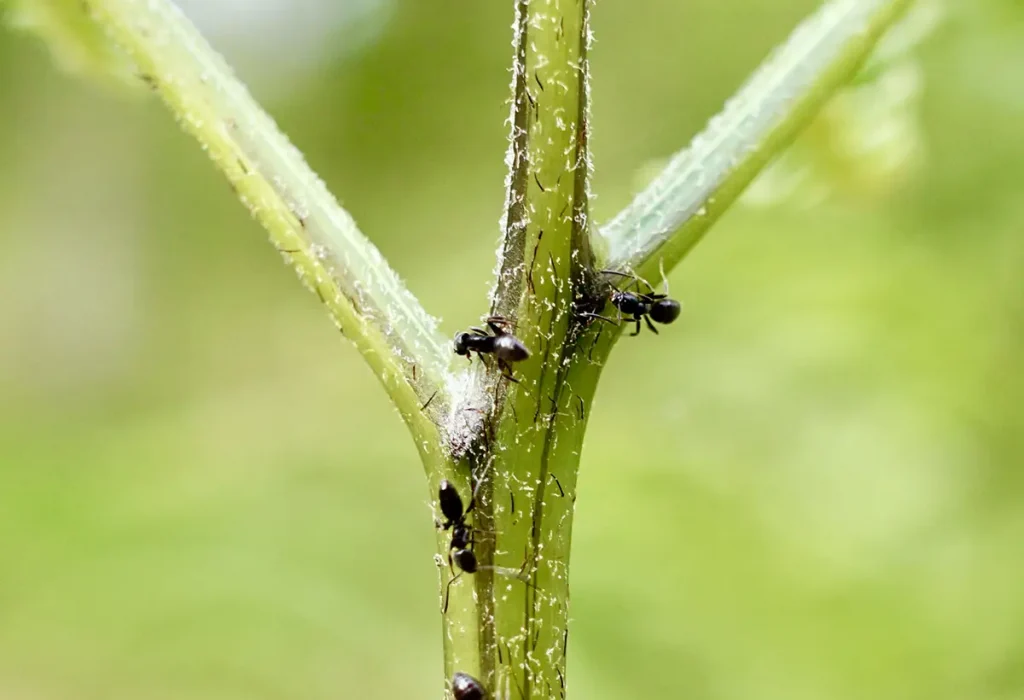
by Randall Brown
Collaborations across research disciplines can lead to unexpected breakthroughs and discoveries. Collaborations across species lead to unexpected evolutionary paths of mutual benefit.
For example, some plants have managed to recruit ant bodyguards. They produce sugary nectar on their leaves that attracts the ants, then these very territorial and aggressive ant mercenaries patrol “their” plant and sting or bite herbivores that try to eat it.
These relationships are well-documented in flowering plants, but they also occur in non-flowering ferns. This is weird news for researchers, as it has long been thought that ferns lack the nectaries for such complex biotic interactions.
Jacob Suissa, assistant professor in the UT Department of Ecology and Evolutionary Biology, worked with colleagues at Cornell University, including fern expert Fay-Wei li and ant expert Corrie Moreau, to investigate how this phenomenon developed over the millennia. They recently published findings in Nature Communications about the evolutionary timeline and underlying factors of this interspecies partnership.
“The new elements of this work are twofold,” explained Suissa. “First, we discovered that nectaries—the structures that produce sugary nectar to attract ant bodyguards—evolved in ferns and flowering plants around the same time.”
This happened some 135 million years ago, coinciding with the rise of plant-ant associations in the Cretaceous period.
“This timing is quite spectacular given that it is very late in fern evolutionary history, nearly 200 million years after their origin,” said Suissa. “But it’s very early in flowering plant evolutionary history, nearly at the start of their origin in the Cretaceous.”
The second new element is how it all happened. Ferns originally flourished as terrestrial plants, growing on the forest floor. They transitioned in a major way in the Cenozoic Era, around 60 million years ago, becoming epiphytic, or tree dwelling, plants.
They learned some new habits on their way up.
“We discovered that as ferns left the forest floor and moved into the canopies, either as epiphytes, climbers, or tree ferns, they tapped into the existing ant-flowering plant interactions and evolved nectaries,” said Suissa.
This presents a curious dynamic in the ecological and evolutionary history of these two plant lineages. Ferns and flowering plants diverged from a common ancestor more than 400 million years ago, but then hit their stride in parallel with their nectary evolution and the mutually beneficial ant-plant tradeoff.
“This suggests that there may be some ‘rules of life’ governing the evolution of non-floral nectaries and ant-plant mutualism,” said Suissa. “This work can help future investigations by providing the evolutionary framework or backdrop for ecological, developmental, or genomic analyses.”
Read Suissa’s full paper, “Convergent evolution of nectaries in ferns facilitated the independent recruitment of ant-bodyguard from flowering plants,” in Nature Communications.
Faculty Recognized for Excellence in Teaching, Service, and Academic Outreach
Faculty Recognized for Excellence in Teaching, Service, and Academic Outreach
During the 2023 UT College of Arts and Sciences faculty convocation, EEB faculty received awards for excellence in teaching, research, and academic outreach.
Benjamin Keck, Lecturer – Excellence in Teaching Awards: Lecturer
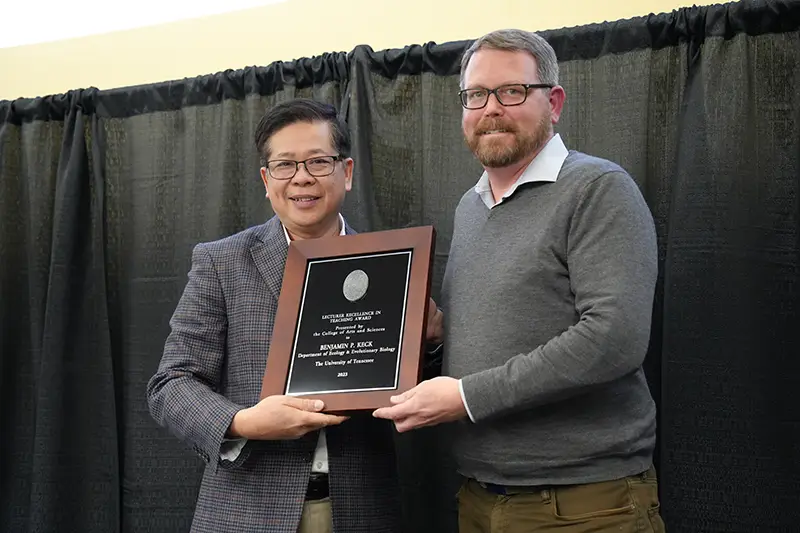
Ben Keck is an outstanding and dedicated lecturer for the University of Tennessee who has supported student learning in the classroom, in the field, and in the lab for many years. His teaching practice stands out for his high level of innovation, enthusiasm, and positive course climate.
Keck is a dedicated undergraduate teacher of both introductory biology courses and upper-level majors courses. His appointment is across two units—general biology and EEB—and he makes a huge contribution both as a teacher and a mentor to students. As the Director of the Ichthyology Collection at UT, Keck also makes outstanding contributions to community outreach efforts to highlight the diversity and importance of fishes in Eastern Tennessee.
Randy Small, Professor – Excellence in Teaching Awards: Senior
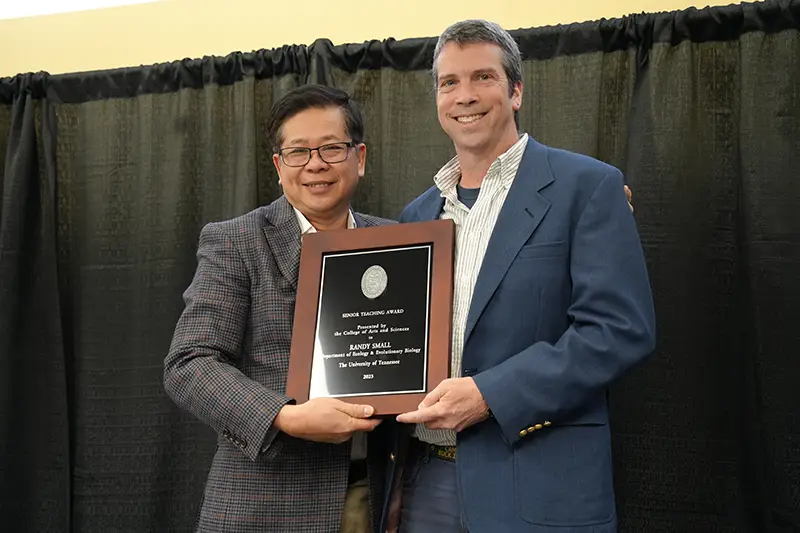
Randy Small is a full professor in EEB and has been the director for Teaching and Learning in the Division of Biology since 2019. His first rate and long-standing contributions to the educational mission of the College of Arts and Sciences makes him the perfect winner of this award. Legions of students in EEB as a department and the whole Division of Biology have benefited from Small’s dedication to student success, outstanding teaching practice, and educational vision and leadership. This award is long overdue.
Laura Alexandra Russo, Assistant Professor – Faculty Academic Outreach Award: Research & Creative Activity
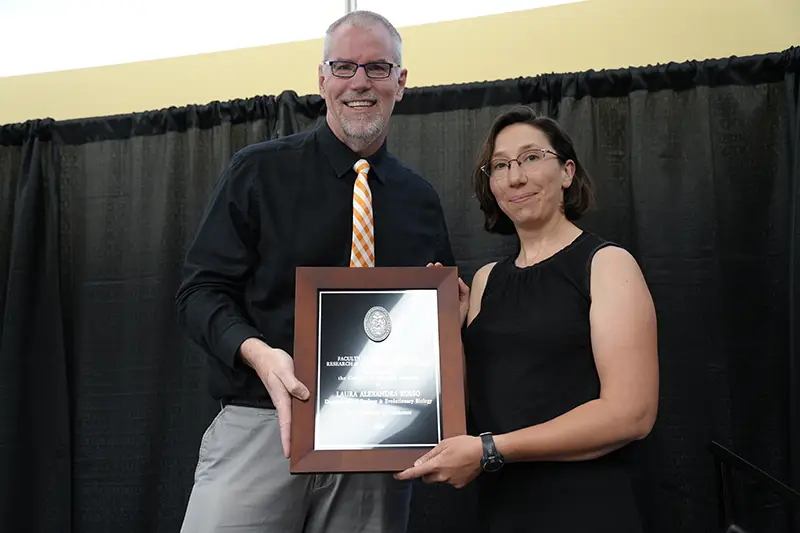
Russo is an outstanding faculty member in the Department of Ecology and Evolutionary Biology whose outreach has raised the profile of UT Knoxville scientifically and to the public. Her research engages the public, community groups, state agencies, students, and others to tackle declines in bee species and other pollinators and what can be done to reverse these trends. Her approach exemplifies engaged scholarship that is conducted with and in communities.
Russo regularly leads outreach events at state parks like Seven Islands and Roan Mountain and national parks like the Great Smoky Mountains, including pollinator and plant hikes and bioblitzes in which community members find, identify, and document biodiversity. She actively engages with UT Extension, giving seminars and running outreach events at UT’s research and education centers across the state.
Elisabeth Schussler, Professor – Outstanding Service Award
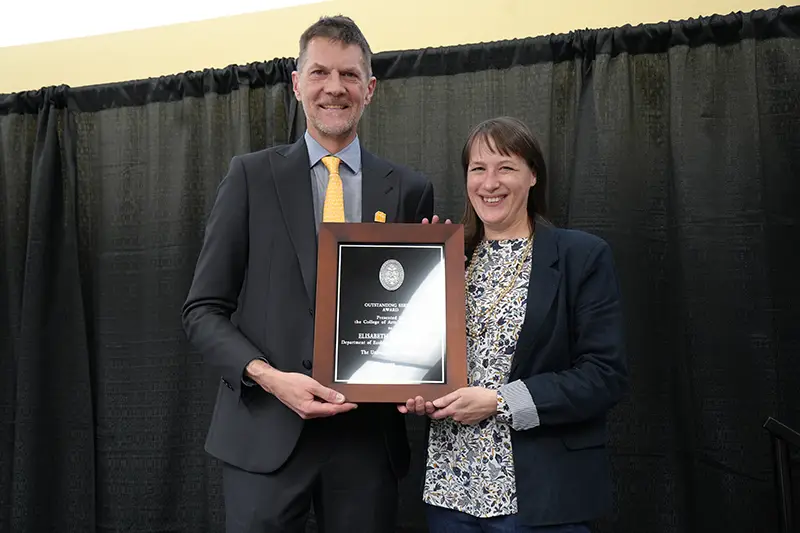
In her role as Director of Biology Teaching and Learning, Professor Schussler ensures our students in the lower-division biology courses receive excellence instruction from our graduate teaching assistants and nontenure-track faculty.
She provides professional development opportunities for instructors to be at the top of their teaching game and it is this passion for high-quality teaching across the natural sciences that led her to build teams of faculty members across the college and university who also want high-quality instruction in lower-level courses. As Faculty Senate president, she supported the ideas of liberal arts learning through cultivation of a strong shared governance process.
Kimberly Sheldon’s Research Featured on CBS
Kimberly Sheldon’s research on climate change effects on dung beetles was featured on CBS Saturday Morning, as part of a segment on insect declines in the Anthropocene.
American Academy of Microbiology Colloquium: Microbes in Models Final Report
EEB’s Dr. Stephanie Kivlin joins her collaborators in announcing the release of their new report, “Microbes in Models.” Climate change threatens all life on Earth. The report outlines top challenges to overcome to better incorporate microbial processes into Earth system models and improve model projections that inform climate change mitigation actions. Read more here: https://eeb.utk.edu/wp-content/uploads/2023/06/Microbes-in-Models-Report_FINAL.pdf
EEB Spring 2023 Awards Video
Faculty, staff and students from EEB gathered on May 18, 2023 to celebrate the end of the semester, recognize award-winners, and honor retirees. Check out this YouTube video to see all of the winners, along with some photos from the celebration.
Tiny Fish Makes Big Splash
Read about Dr. David Etnier’s Snail Darter legacy here:
EEB Faculty Awarded
Three of EEB’s own faculty members, Nina Fefferman, Orou Gaoue, and Xingli Giam, were honored with awards at the recent College of Arts and Sciences Faculty Awards Night.
Nina Fefferman was recognized with the Academic Outreach Award for Service – she was not able to attend the ceremony, as she was doing more of the pandemic preparedness / response work for which she was honored.
Orou Gaoue was recognized with the Academic Outreach Award for Research and Creative Activity.
Xingli Giam was recognized with the Early Career Excellence in Research and Creative Achievement award.
Congratulations to these faculty members!
Investigating New Digital Authorities
In the years since social media became part of our daily lives, an increased number of individuals are self-organizing online around identity, social topics, and various other interests. This transition leads to a new type of cultural authority and one that researchers are investigating to understand how the online human world interacts with the offline human world at both the individual and collective level.

“I’ve always been puzzled by how presumably reasonable people can come up with completely different strong beliefs or understandings about the same events or processes that happened or are happening in different situations affecting their personal life or our society,” Gavrilets said. “Over the last couple of years, with the 2020 elections and COVID, these differences have become particularly striking and their real and potential consequences particularly dangerous.”
The big question he wants to answer? “How are contemporary social media changing human social and cultural evolution?”
Understanding How New Authorities Develop
Gavrilets and colleague Neil Johnson from the George Washington University will leverage recent work on online behaviors to build a new understanding of how these new authorities develop and function. They will look at how these new authorities contribute to cultural polarizations and how their efforts and impacts are influenced.
“We will study the emergence of self-organized groups spouting extremism, hate, and vaccine hesitancy within and across social media platforms,” Gavrilets said. “We will look at their structure and try to understand how its composition defines who listens and how these new identity groups emerge.”
Gavrilets, a mathematical biologist whose work focuses on human social behavior, will borrow ideas and theoretical tools from ecology and evolutionary biology and apply them to human social behaviors online.
“This work will not only help us to understand online human social behaviors better, but also how our attitudes and beliefs are shaped,” said Gavrilets, who also is the director of the Center for the Dynamics of Social Complexity at UT.
“Misinformation about science, climate change, vaccination, COVID, and political processes and events has a potential to affect the life, prosperity, and wellbeing of everyone in a negative way,” Gavrilets said. “By understanding how new social and cultural authorities are formed online, we can develop better policies for governments and businesses to counter misinformation and simultaneously promote public understanding of science-based policies aiming to improve our life and prosperity.”
To learn more, read the full project summary online.
About the John Templeton Foundation
Founded in 1987, the John Templeton Foundation supports research and catalyzes conversations that inspire people with awe and wonder. They fund work on subjects ranging from black holes and evolution to creativity, forgiveness, and free will. They also encourage civil, informed dialogue among scientists, philosophers, theologians, and the public at large. Their aspiration is to help people create lives of meaning and purpose and to become a global catalyst for discoveries that contribute to human flourishing.
With an endowment of $3.8 billion and annual giving of approximately $140 million, the Foundation ranks among the 25 largest grantmaking foundations in the United States. Headquartered outside Philadelphia, their philanthropic activities have engaged all major faith traditions and extended to more than 57 countries around the world.
- 1
- 2
- 3
- …
- 5
- Next Page »


